Non-humanized antibodies can cause severe rejection in the body; for instance, the clinical application of mouse monoclonal antibodies is limited by the human anti-mouse antibody (HAMA) response.
Humanization of mouse monoclonal antibodies or alpaca nanobody by genetic engineering can increase their similarity to antibodies naturally produced in humans, greatly enhancing their in vivo tolerability.
Using complementarity-determining region (CDR) grafting technology and computer-aided molecular modeling, Sino Biological provides high-quality monoclonal antibody humanization services that enable a high degree of successful humanization (>95%).
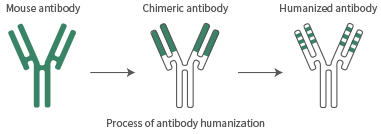
Image Credit: Sino Biological
Service highlights
- The sequence homology is over 95%; PTM and aggregation prediction reports are also available
- 100% success rate
- As quick as 3–4 weeks to offer required humanized antibodies
- Affinity evaluated by ELISA and SPR/BLI
Service details for antibody humanization
Timeline: 3-4 weeks
- Affinity validation
- Antibody/antigen affinity validation
- Preparation of human-mouse chimeric antibody
- Transient purification and expression in HEK293 cells
- Chimeric antibody-antigen interaction detection
- Preparation of humanized variants
- 3D structural modeling of antibodies
- Back mutation
- Vector construction and plasmid preparation
- Transient transfection of HEK293 cells and purification
- SDS-PAGE and UV analysis
- Affinity detection: ELISA, Biacore, and Octet
- Deliverables
- Top three humanized antibodies, 0.2~0.5 mg per strain (a minimum of 1 humanized ab has a comparable affinity with parental ab)
- Antibody sequences
- H and L chains in discrete expression vectors
- Remaining antigens
- CoA
- PTM and aggregation prediction report (optional)
Customers provide
- Sequences of the parental antibodies.
- Protein antigens: Purity>90%, concentration >1 mg/mL, and PBS formulation (if not, please inquire first).
Service process

Image Credit: Sino Biological
Featured case study of antibody humanization service
Mouse mAb humanization
As illustrated in the image below, the humanized antibody has a comparable affinity with the parental antibody.
Affinity of antibody before and after humanization
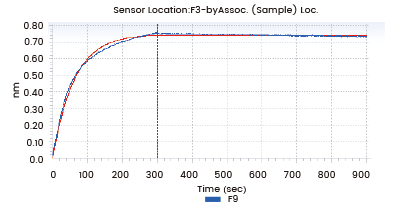
Before humanization, mouse antibody KD=6.38E-12M. Image Credit: Sino Biological
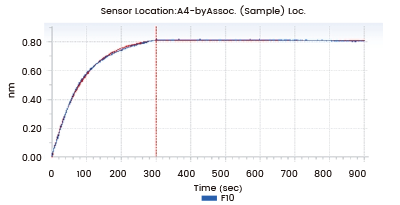
After humanization, humanized antibody KD=3.90E-12M. Image Credit: Sino Biological
Nanobody humanization
The humanized nanobody possesses a comparable affinity with the parental after humanization.
Affinity kinetic analysis
Source: Sino Biological
| Sample |
KD(M) |
Kon(1/Ms) |
Koff(1/s) |
| Parental VHH |
1.04E-08 |
1.33E+05 |
0.001379 |
| Humanized VHH 1 |
9.72E-09 |
1.14E+05 |
0.001104 |
| Humanized VHH 2 |
8.30E-09 |
1.29E+05 |
0.001072 |
| Humanized VHH 3 |
9.26E-09 |
1.05E+05 |
0.000972 |
Parental VHH
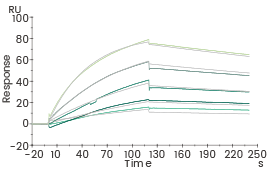
Affinity kinetic analysis of Parental VHH (Biacore). Image Credit: Sino Biological
Humanized VHH 1
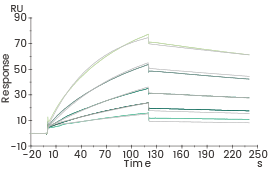
Affinity kinetic analysis of Humanized VHH 1 (Biacore). Image Credit: Sino Biological
Humanized VHH 2
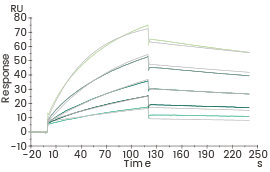
Affinity kinetic analysis of Humanized VHH 2 (Biacore). Image Credit: Sino Biological
Humanized VHH 3
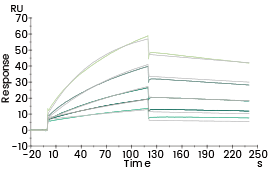
Affinity kinetic analysis of Humanized VHH 3 (Biacore). Image Credit: Sino Biological
More featured antibody services
- High-throughput antibody service
- Phospho-specific antibody service
- Anti-idiotype antibody production service